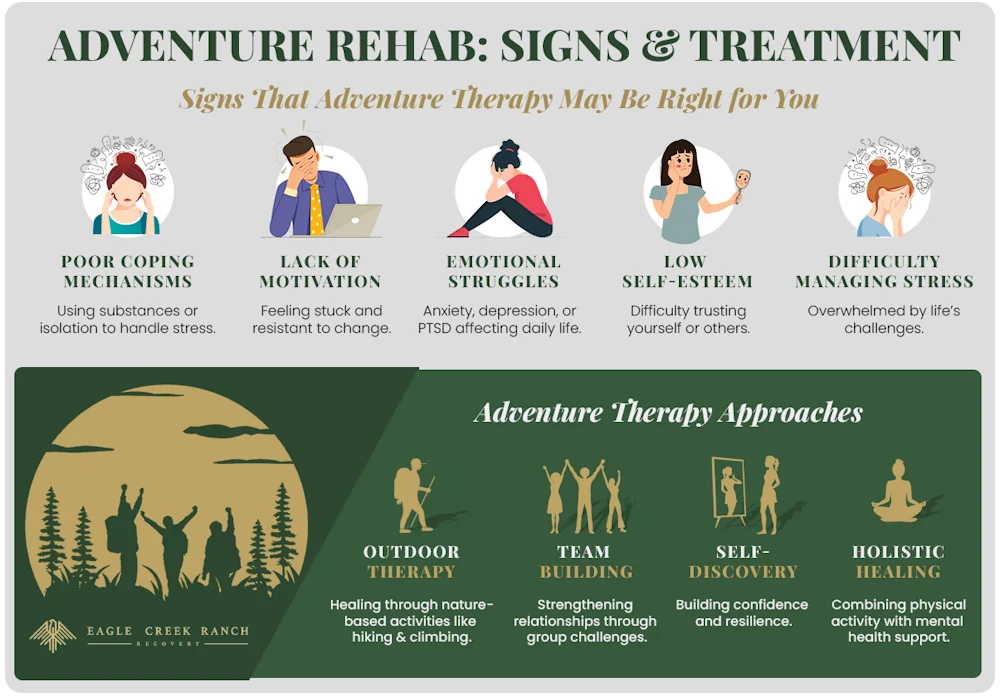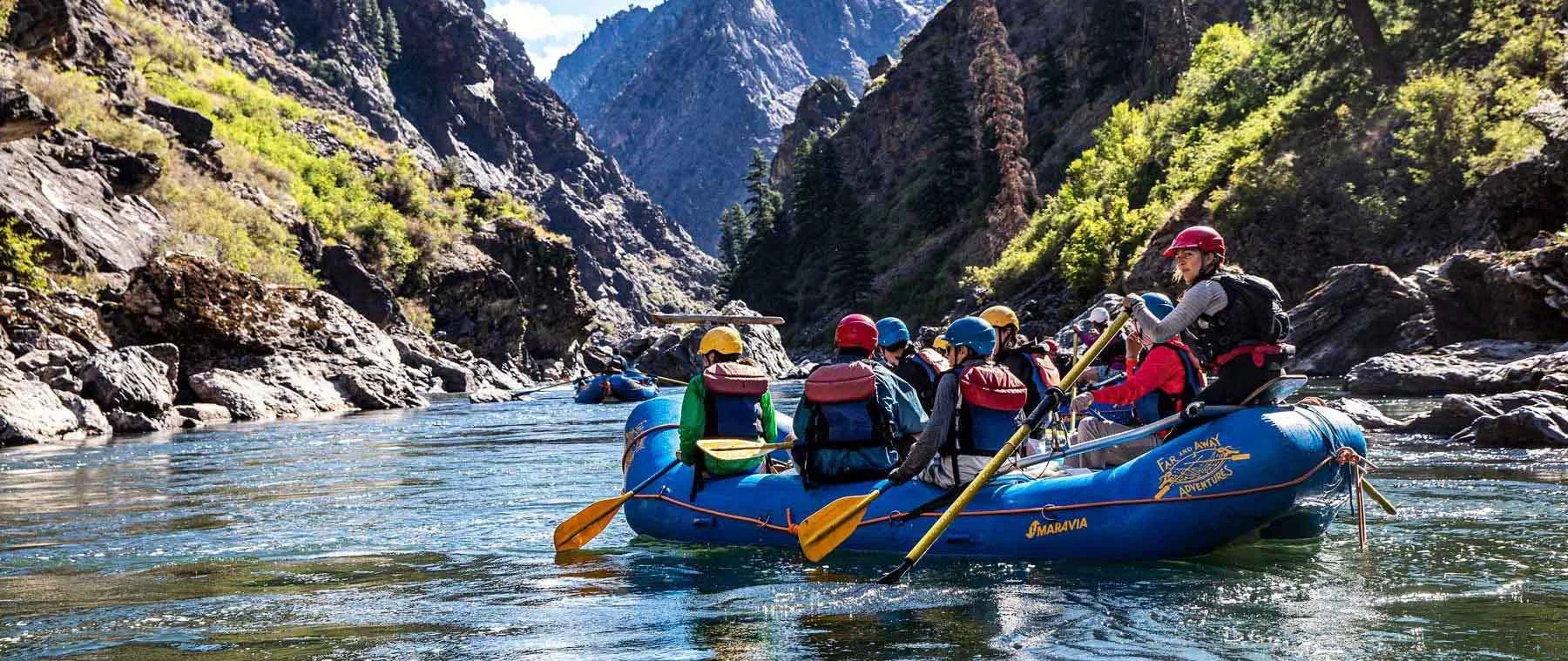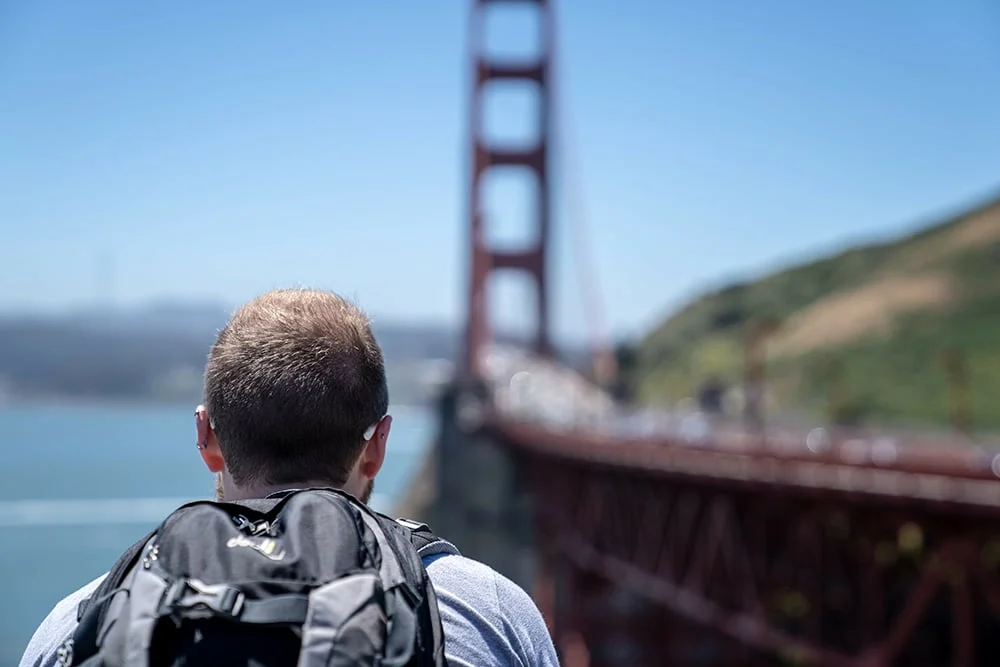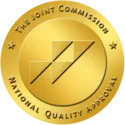Adventure Therapy Program for Addiction

In addiction recovery, many different therapeutic interventions work to help an individual heal. These include individual therapy, group therapy, and 12-step programs. However, many holistic therapies also benefit individuals who are undergoing treatment for mental illness or substance use disorders.
One of these is adventure therapy, which uses outdoor activities as a way to help people in treatment learn new skills, cope with emotions, and develop a greater understanding of self-awareness. When combined with inpatient residential treatment, participants are fully supported as they are taken out of their comfort zone and immersed in an adventure therapy setting, allowing them to reap the many benefits of this increasingly popular type of therapy.
What is Adventure Therapy?
These activities are often combined with other therapy modalities, such as cognitive-behavioral therapy (CBT) or group therapy. Adventure therapy is particularly beneficial for individuals with conditions like:
- Anxiety disorders
- Depression disorders
- Trauma
- Post-Traumatic Stress Disorder (PTSD)
- Eating disorders
- Substance use disorders
- Schizophrenia
This type of therapy is based on the premise that by engaging in challenging activities, individuals can learn more about themselves and develop the skills they need to cope with difficult situations. There are many different adventure activities that can be a part of adventure therapy, such as hiking, rock climbing, canoeing, and zip lining. While engaging in activities, individuals are learning to listen, practice safety, and develop their emotional regulation and self-awareness skills.

Types of Adventure Therapy
A wilderness therapy program, a subset of adventure therapy, is an experiential treatment approach used in addiction recovery. It involves outdoor activities like hiking, camping, and team-building exercises guided by trained adventure therapists. This type of therapy generally lasts anywhere from two weeks to a month.
The therapy aims to foster personal growth, self-discovery, and improved social skills by challenging participants in a natural setting. It is designed to help individuals with substance use disorders develop trust, cooperation, and communication skills. Wilderness therapy is recommended to adolescents and teens in particular, but there is controversy and contention around its efficacy in terms of stopping antisocial behaviors.
This type of therapy generally takes place for a day or weekend. Adventure-based therapy usually involves experiential activities that include perceived risks and challenges, such as rock climbing, kayaking, zip-lining, or obstacle courses. This therapeutic approach is designed to improve psychological, physical, social, and spiritual well-being by pushing participants beyond their comfort zones in a supportive environment.
In the context of addiction treatment, adventure-based therapy helps individuals develop coping skills, build self-confidence, and foster a sense of responsibility and teamwork. By participating in these activities, individuals learn to manage stress, improve communication, and develop healthier relationships, all crucial skills for overcoming addiction. The therapy also encourages personal growth and resilience, making it a valuable complement to traditional addiction treatment methods.
Long-term residential camping, another type of adventure therapy, involves extended stays in outdoor camp settings where individuals engage in therapeutic activities over a prolonged period, sometimes lasting several months to a year. This approach is designed to provide a structured environment away from everyday distractions, allowing participants to focus on recovery and personal development. In addiction treatment, long-term residential camping offers a supportive community where individuals can work on building healthy habits, developing coping strategies, and improving interpersonal skills.
Water-based therapy, also known as aquatic therapy, is a form of adventure therapy that utilizes water-based activities to aid in addiction recovery. This therapeutic approach leverages the unique properties of water, such as buoyancy and resistance, to facilitate physical, mental, and emotional healing.
In addiction treatment, water-based therapy includes activities like swimming, aqua running, and resistance exercises. The soothing nature of water can also boost mood and lead to increased self-confidence, providing a calming environment that supports mental well-being. Water-based therapy is particularly beneficial for individuals with physical limitations or those who find traditional exercise challenging, as it offers a low-impact way to build strength and endurance.
Contact Eagle Creek Ranch
Recovery Today!
Why Wait? Find The Help You Need By Reaching Out To Us Today! Our Admissions Team Is Standing By.
The Benefits of Adventure Therapy

In addiction recovery, everyone faces different challenges. Adventure therapy is designed to help you build confidence and resilience, which can help you with other parts of your recovery journey.
When adventure therapy is a part of your comprehensive treatment plan, there are many benefits you may see:
- A decrease in symptoms of anxiety and depression
- Increased self-efficacy and self-identity
- Improved executive functioning
- Improved interpersonal skills
- Identity development
- Improved grit
- Trauma resilience
- Increased ability to self-advocate
- Diminished feelings of hopelessness
During adventure therapy, participants are presented with many opportunities to learn, overcome challenges, and grow. A meta-analysis published in The Open Psychology Journal indicates that adventure therapy shows promising outcomes for those who participate in it. Compared to those who receive traditional talk therapy, adventure therapy participants had increased self-efficacy, improved executive functioning, and a reduction in feelings of suicidality.
Principles Behind Adventure Therapy
In traditional therapy, patients spend time in a room and talk about their feelings or engage in other activities that encourage reflection. In contrast, adventure therapy programs focus on helping patients take direct and immediate action toward solving their problems. This type of therapy is based on the belief that change comes from taking action. Patients can learn new skills and gain confidence by achieving success here.
Resistance to change is not conducive to recovery, and many people in treatment start their healing journey feeling stuck. An adventure therapy program gets patients out of their comfort zones and into new environments where they can explore. By leaving their familiar surroundings behind, patients can gain a new perspective on their lives and the issues they are struggling with.
When someone is dealing with addiction or a mental health crisis, change can seem daunting or even impossible Through outdoor activities and adventure-based learning, patients can begin to understand that they have the power to make changes in their lives. This growth mindset helps people manage behavioral health issues and even learn how to develop healthy relationships.
When someone is in a natural environment, it can be easier to assess their capabilities. By engaging in physical activity, adventure therapy can help patients understand their strengths and weaknesses and how they can use those to overcome challenges. The more a participant engages in adventure experiences, the more therapeutic benefits they will receive and the more confident and strong they will become.
When someone is in a natural environment, it can be easier to assess their capabilities. By engaging in physical activity, adventure therapy can help patients understand their strengths and weaknesses and how they can use those to overcome challenges. The more a participant engages in adventure experiences, the more therapeutic benefits they will receive and the more confident and strong they will become.
In many types of therapy, the focus during the therapeutic process is put on maladaptive behaviors, unhealthy patterns, and how a person can change. In adventure therapy, the focus is on successful behaviors. This helps patients see that they are capable of achieving success and making positive changes in their lives.
Rather than being the authority figure, an adventure therapist is often taking on the role of a guide or coach. This helps patients feel more comfortable and allows them to take more ownership of their treatment.

Learn More About Eagle Creek Ranch Recovery’s Therapy Programs

At Eagle Creek Ranch Recovery in Idaho, adventure therapy offers a unique and transformative journey toward mental wellness and building greater self-esteem. By immersing individuals in the natural beauty and challenges of the great outdoors, this innovative therapeutic process strengthens resilience, boosts self-confidence, and fosters profound healing.
We invite you to embark on this empowering path of self-discovery and healing. Reach out to us today and let Eagle Creek Ranch Recovery be your partner in building a healthier, more fulfilling future.

Clinical Director
Kendall Maloof is the clinical director at Eagle Creek Ranch Recovery. She is a licensed marriage and family therapist and has held multiple leadership roles before settling here at Eagle Creek Ranch Recovery. Kendall received her master’s degree in marriage and family therapy from the Chicago School of Professional Psychology in 2016. Her career in mental and behavioral health began in 2014 when she took up internships in both the nonprofit and for profit sectors. She interned at multiple reputable companies, such as The Living Success Center and 449 Recovery in California.
In 2019, Kendall became the clinical director of Sunsets Recovery for Woman, a dual diagnosis program in southern California. Kendall is a natural leader. She has an incredible ability to problem solve and stay calm in any situation. Kendall never fails to show up when she is needed, and her calm demeanor makes her team and clients feel at ease. Eagle Creek Ranch Recovery is proud to have Kendall as our clinical director.


